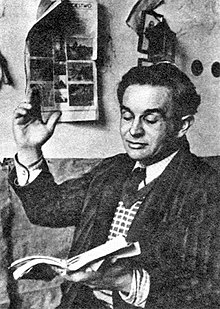Konstanty Ildefons Gałczyński
| Konstanty Ildefons Gałczyński | |
|---|---|

Konstanty Ildefons Gałczyński in 1947
|
|
| Born | Konstanty Ildefons Gałczyński 23 January 1905 Warsaw, Congress Poland |
| Died | 6 December 1953 (aged 48) Warsaw, Poland |
| Resting place | Military Powązki Cemetery |
| Occupation | Poet |
| Language | Polish |
| Nationality | Polish |
| Notable works | Zaczarowana dorożka |
Konstanty Ildefons Gałczyński (23 January 1905 – 6 December 1953), alias Karakuliambro, was a Polish poet. He is well known for the "paradramatic" absurd humorous sketches of the Green Goose Theatre.
Born to a lower-middle-class family in Warsaw, Gałczyński was evacuated with his parents at the outbreak of World War I, and from 1914 to 1918 he lived in Moscow, where he attended a Polish school. Returning to Poland in 1918, he studied classics and English language at the University of Warsaw, submitting a dissertation on a non-existent nineteenth-century English poet, Morris Gordon Cheats.
His literary debut came in 1923 and was a member of the Kwadryga group of poets, and he was linked to satirical and political publications. In 1930 he married Natalia Avalov. From 1931-33, he held the post of cultural attaché in Berlin. From 1934-36 he was in Vilnius. He settled there at 2 Młynowa Street. There, in 1936, the couple's daughter Kira was born. Through his works Gałczyński refers to the atmosphere of Vilnius, and that which Adam Mickiewicz left behind.
With the outbreak of World War II, Gałczyński received a draft card from the army. He took part in the Polish September Campaign of 1939. On 17 September, he became a Russian prisoner of war and was later captured by the Germans. He spent the duration of the occupation in the Stalag XI-A prisoner-of-war camp in Altengrabow, his poems printed secretly in anthologies. After the war he travelled to Brussels and Paris, returning to Poland in 1946. He established The 13 Muses Club in Szczecin in 1948 before moving back to Warsaw, and produced work for numerous weekly magazines.
...
Wikipedia
